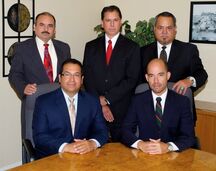
The death of a loved one is one of the most devastating things in life, and no one person is immune to its effects regardless of the circumstances. Natural causes indeed cause most deaths, but it is also possible to lose a loved one due to someone else's negligence and serious injury.
A traumatic brain injury (TBI) is defined by the Centers for Disease Control and Prevention (CDC) as a disruption of normal function of the brain triggered by bumps, blows, or jolts to the head or a penetrating head injury. Just under 2 million Americans suffer from these potentially life-altering injuries every year. TBI is responsible for approximately 225,000 related hospitalizations, over a million trips to emergency departments, and 65,000 deaths each year. How Do TBIs Occur and Who is Most Vulnerable?
According to the CDC, 176 TBI-related fatalities occur daily. The number one cause of TBIs in the US are falls and coming in second are car accidents. TBIs are the leading cause of TBI-related deaths among children and young adults ages 5-24 years old. Additionally, senior citizens have a more difficult time recovering from traumatic brain injuries, particularly those provoked by car accidents, making elders extremely vulnerable to fatalities related to TBIs.
Negligence, recklessness, intentional irresponsible behavior, and impaired driving lead to car accidents and severe injuries for countless victims. Traumatic brain injuries often result in death and wrongful death for innumerable unfortunate victims. Losing a close family member is incredibly difficult, especially when another person's recklessness causes their death. In the event that you lose a family member because of another's negligence, filing a wrongful death claim may be a valid legal avenue to take. Wrongful death lawsuits are filed against an individual who caused the death of another person through negligence or malicious actions. As a result, these lawsuits are filed on behalf of deceased victims who would have sought a personal injury claim had survived. Who can file a wrongful death claim in California?
Survivors or legal representatives of the deceased may file a wrongful death claim in the State of California. For example, this includes surviving spouses, domestic partners, as well as children. The wrongful death lawsuit can also be brought about by other family members such as siblings, parents, or legal guardians if there are no direct survivors. For another example, the deceased person's grandchildren (if the deceased person's children have already passed away) may pursue a wrongful death suit.
Is It Difficult to Prove Wrongful Death?
Wrongful death lawsuits can indeed be challenging to prove. It is necessary, in these matters, to establish all four legal elements of wrongful death. In the absence of any of the required four elements, the legal standard is not considered met, and the wrongful death lawsuit may not succeed. Individuals seeking compensation for wrongful death must satisfy all four aspects of wrongful death to receive compensation.
It is easier to meet the burden of proof in civil cases than in criminal cases. Criminal court cases are the only ones requiring proof beyond a reasonable doubt. Civil cases don't require the same level of proof as criminal cases, making claims easier to prove. The Four Legal Elements of Wrongful Death
The four legal elements of negligence are duty, breach of duty (the death of another person), causation, and damages.
1 - Negligence: It is the plaintiff's responsibility to prove that the defendant was negligent in the event of their loved one's death. The act of negligence entails failing to act responsibly or reasonably, which results in injury or death. To be awarded compensation, the defendant must be proven to have committed acts of carelessness, negligence, or recklessness that contributed wholly or partially to the death. 2 - Duty and Breach of Duty: An obligation of care must have existed between the defendant and the deceased. In each situation, an individual has the responsibility to act rationally as another individual would. Drivers are also required to obey traffic laws and not cause injury to others when operating their vehicles. Any action or an omission of action that any other reasonable party wouldn't have committed is considered a breach of duty, and that includes acts of recklessness or carelessness by the defendant and any disregard for the safety of others. Breach of duty also exists when the defendant exhibits malicious intent to harm another individual. In wrongful death cases, someone is killed because of a breach of duty. 3 - Causation: The plaintiff must demonstrate the defendant's negligence led to or substantially contributed to the death of a loved one if they are pursuing a wrongful death claim. The plaintiff must prove that the fatal injury (TBI in this instance) or death would not have occurred without the defendant's negligence. It is not required for plaintiffs to prove the defendant intended to hurt or kill their loved one. You only need to establish that the defendant's negligence caused your loved one's death. 4 - Damages: An individual must prove that their loved one's death resulted in quantifiable legal damages as the fourth element of a wrongful death case. After a loved one passes away, economic losses are quantified, including:
Evaluating non-economic damages (based on mental and emotional losses) is often more challenging to tabulate. These damages can include loss of relationship (companionship), comfort, attention, affection, loss of sexual intimacy, and more. Additionally, non-economic damages include the pain and suffering the deceased experienced before death. What to Do Following the Death of Your Loved One
Proving wrongful death can feel overwhelming and even challenging; however, if you have lost your loved one after they suffered a traumatic brain injury that resulted from a car accident caused by someone else's recklessness or negligence, you should contact an experienced wrongful death attorney.
Note: If you lost a loved one in California, you have two years from the date of their death to file. Survivors of the deceased may lose their right to file a lawsuit if they do not file a claim within those two years in most cases. Hiring an Experienced Attorney
Castillo and Associates is a California personal injury law firm built on experience, skill, knowledge, and years of successful cases in which victims received the compensation they deserved. We have recovered over 300 million dollars in compensation for our clients to date. Whether you have suffered from a personal injury, catastrophic injury, or wrongful death, our attorneys will fight vigorously for your right to compensation. We can help you determine your options and guide you further in each step of the process. Our experienced attorneys at Castillo & Associates can help you gather any evidence you may need to get the maximum benefits for your injury. Contact us today at 1-800-497-9774.
At Castillo & Associates, we have offices conveniently located throughout Southern California in Los Angeles County (Pomona), Inland Empire (Riverside), Coachella Valley, and San Diego. We are Bilingual Attorneys and have over 33 years of combined experience in Workers' Compensation Claims & Workers Compensation Law as well as Personal Injury Law.
|
IE Legal Hub
Local legal information, published by local Inland Empire lawyers. Are you a local attorney?
Archives
July 2023
Categories
All
|


 RSS Feed
RSS Feed




